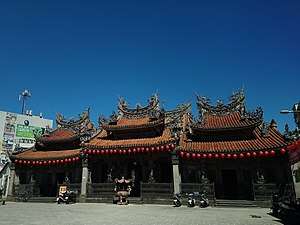Qingshui (monk)

Qingshui (Chinese: 清水; pinyin: Qīngshuǐ; Pe̍h-ōe-jī: Chheng-chúi; 1047-1101), also known as Chó͘-su-kong (Chinese: 祖師公; Pe̍h-ōe-jī: Chó͘-su-kong), born Chen Zhaoyin (Chinese: 陳昭應; Pe̍h-ōe-jī: Tân Chiau-èng) was a Chan Buddhist monk during the Northern Song from Anxi County, Quanzhou. He was said to have gained supernatural powers gained through his skill in speaking the dharma and meditation.[1] Through this, he is said to have saved the town of Anxi during a period of drought, bringing rain as he went from place to place. In reverence, the villagers built shrines to him and hence became a deified person in Chinese folk religion.
Qingshui is also known by the following nicknames:[1]
- Dropping Nose Ancestor (Chinese: 落鼻祖師公; Pe̍h-ōe-jī: La̍k-phīⁿ chó͘-su-kong), known for the prominent nose featured in Qingshui's effigies
- Black Faced Ancestor (Chinese: 烏面祖師公; Pe̍h-ōe-jī: o͘-bīn-chó͘-su-kong)
Worship of Qingshui is especially popular in Taiwan, where he is worshiped by local villagers for protection and in overseas Hokkien-speaking communities. His birthday is celebrated on the sixth day of the sixth lunar month.
Life
Qingshui was born in 1047. He became a monk when he was young, and his early potential was recognized by the chief monk at the temple. When the chief monk died, Qingshui became the next chief monk at the temple. He is credited with many famous quotes made during his lifetime.
Achievements
Below listed his achievements:
- building bridges- He helped build more than 10 different bridges around the towns.
- herb medicine creation- In china, there is a saying "When you save the life of one, it will even help you more than reaching heaven when you die." And he has learned about many different medical herbs. And his achievements in medicine are even on-par to those of professionals in that era.
- praying for rain- Normal people believe that there is no man that can control the weather, only a man of a holy status passed down by god will be able to achieve this. And when Qingshui was alive, he had numerous successes praying for rain during times of drought.
Worship
It is stated that all the descendants would worship him using fruit, cakes and other vegetables as sacrificial items on his birthday every year to prove their loyalty to his teachings and their loves. And up till now, many people still visit his temple throughout the years to pray for his divine protections. Some also believe they will gain great luck for the rest of the year by paying their visits. God pigs are also a popular sacrifice to Qingshui among the Hakka people.
Temples dedicated to Qingshui
- Snake Temple: Penang, Malaysia
- Qingshui Temple: Taipei, Taiwan
- Zushi Temple: Taipei, Taiwan
- Fushan Temple: Yangon, Myanmar
- Saw Si Gone Temple: Mawlamyine, Myanmar